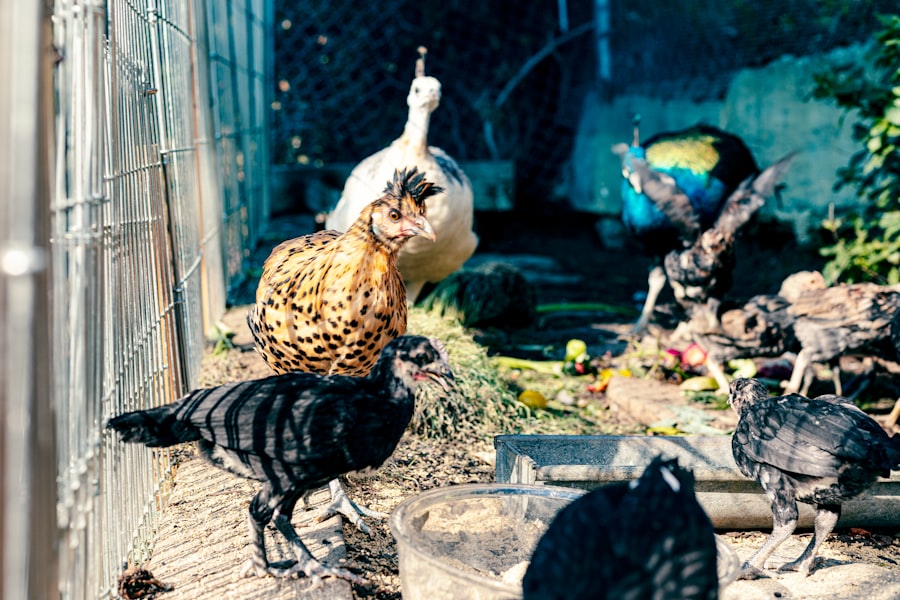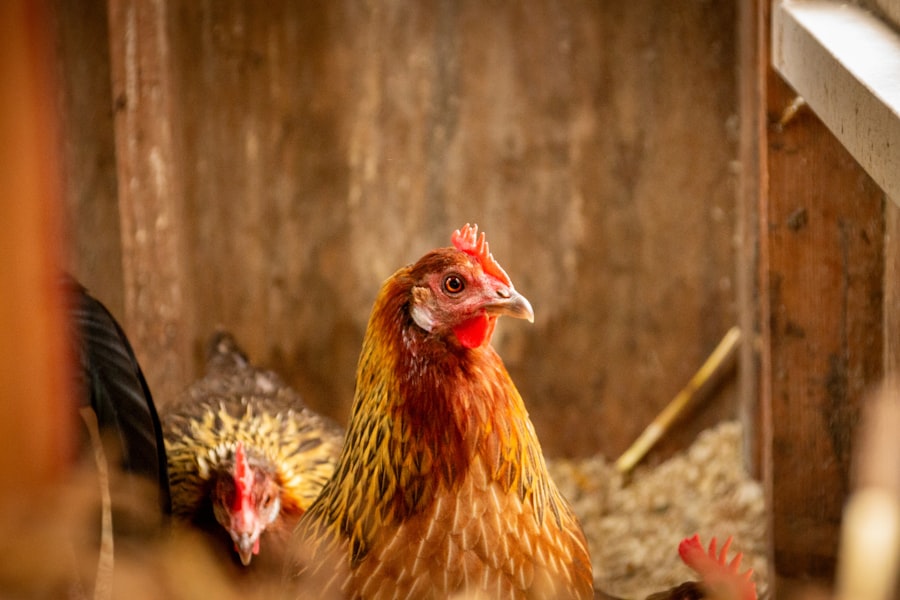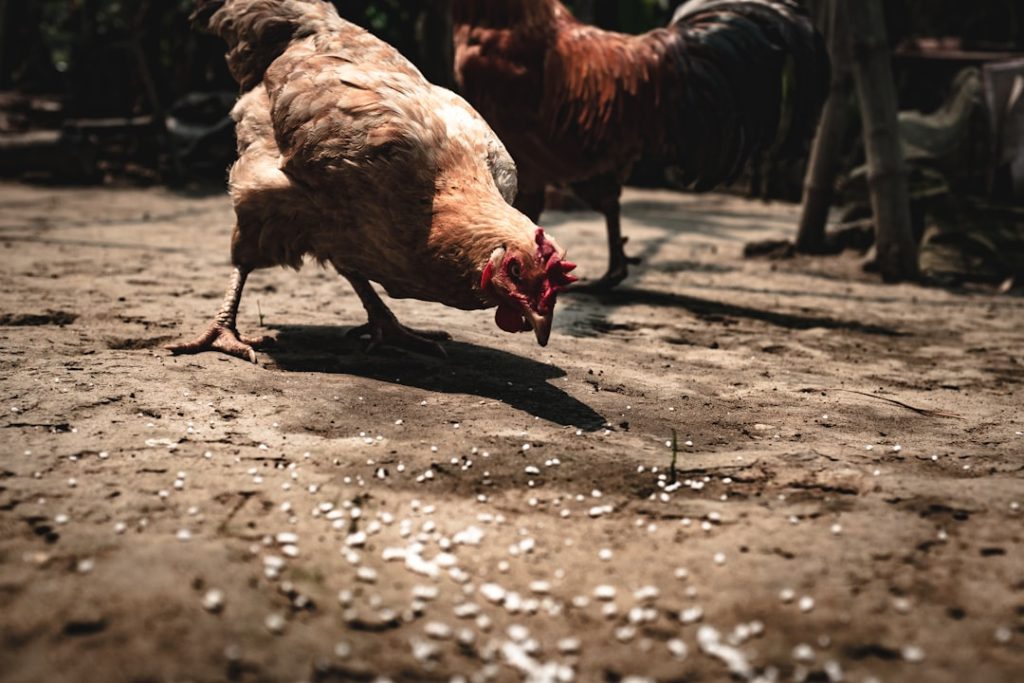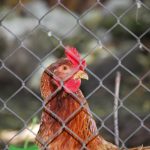Free range chicken care involves providing chickens with access to outdoor areas where they can roam, forage, and exhibit natural behaviors. This approach contrasts with confined poultry systems. However, free range chickens still require attentive care to ensure their health and well-being.
Essential aspects of care include providing a nutritious diet, a safe environment, regular health checks, and protection from parasites and predators. Chickens are social animals that thrive in small flocks. Maintaining appropriate group sizes helps prevent overcrowding and reduces aggressive behaviors.
Free range chickens require constant access to fresh water, shelter from adverse weather conditions, and protection from potential predators. Understanding these fundamental needs is crucial for maintaining a healthy and contented flock of free range chickens.
Table of Contents
- 1 Providing a Nutritious and Balanced Diet for Free Range Chickens
- 2 Creating a Safe and Comfortable Environment for Free Range Chickens
- 3 Implementing Regular Health Checks and Vaccinations for Free Range Chickens
- 4 Managing Parasites and Predators in Free Range Chicken Areas
- 5 Encouraging Natural Behaviors and Exercise for Free Range Chickens
- 6 Seeking Professional Help and Advice for Free Range Chicken Health Concerns
- 7 FAQs
- 7.1 What is free range chicken farming?
- 7.2 How can I keep free range chickens healthy?
- 7.3 What should I feed my free range chickens?
- 7.4 How much space do free range chickens need?
- 7.5 What are some common health issues in free range chickens?
- 7.6 Do free range chickens need vaccinations?
- 7.7 How can I protect free range chickens from predators?
Key Takeaways
- Free range chickens require access to a large outdoor area for foraging and exercise
- A balanced diet for free range chickens includes a mix of grains, greens, and protein sources
- Providing shelter, perches, and nesting boxes is essential for creating a safe and comfortable environment for free range chickens
- Regular health checks and vaccinations are important for preventing diseases in free range chickens
- Managing parasites and predators is crucial for the well-being of free range chickens
Providing a Nutritious and Balanced Diet for Free Range Chickens
Nutrient-Rich Feed for Optimal Health
Free-range chickens have the opportunity to forage for insects, seeds, and plants in their natural environment, but it’s essential to supplement their diet with high-quality feed to ensure they receive all the necessary nutrients. A balanced diet for free-range chickens should comprise a mix of grains, seeds, fruits, vegetables, and protein sources such as mealworms or crickets.
Access to Clean Water is Vital
In addition to providing a balanced diet, it’s crucial to ensure that free-range chickens have access to clean water at all times. Chickens require a constant supply of fresh water for digestion, egg production, and overall health.
Monitoring and Adjusting the Diet
It’s also important to monitor their food intake and adjust their diet as needed based on their activity level, age, and overall health. This ensures that your chickens receive the right amount of nutrients to support their growth and development.
Benefits of a Balanced Diet
Providing a nutritious and balanced diet for free-range chickens is essential for supporting their immune system, promoting healthy growth, and ensuring they lay high-quality eggs.
Creating a Safe and Comfortable Environment for Free Range Chickens

Creating a safe and comfortable environment is crucial for free range chicken care. This includes providing adequate shelter from the elements, such as a coop or sheltered area where chickens can roost at night and seek refuge during extreme weather conditions. The coop should be well-ventilated, predator-proof, and provide enough space for all the chickens to roost comfortably.
It’s also important to provide nesting boxes for hens to lay their eggs in a safe and secluded area. In addition to shelter, it’s important to provide a clean and dry outdoor area for free range chickens to roam and forage. This includes regular maintenance of the outdoor space to remove any potential hazards or toxic plants, as well as providing dust baths for chickens to keep themselves clean and free from parasites.
Creating a safe and comfortable environment for free range chickens is essential for their overall well-being and happiness.
Implementing Regular Health Checks and Vaccinations for Free Range Chickens
Regular health checks and vaccinations are an important aspect of free range chicken care. It’s essential to monitor the overall health of your flock by observing their behavior, appetite, egg production, and physical appearance on a regular basis. This can help identify any potential health issues early on and prevent the spread of disease within the flock.
In addition to regular health checks, it’s important to vaccinate free range chickens against common diseases such as Marek’s disease, Newcastle disease, and infectious bronchitis. In addition to vaccinations, it’s important to practice good biosecurity measures to prevent the spread of disease within your flock. This includes quarantining new birds before introducing them to the existing flock, practicing good hygiene when handling chickens or their eggs, and preventing contact with wild birds or other potential carriers of disease.
Implementing regular health checks and vaccinations for free range chickens is essential for preventing illness and maintaining a healthy flock.
Managing Parasites and Predators in Free Range Chicken Areas
Managing parasites and predators is an important aspect of free range chicken care. Parasites such as mites, lice, and worms can cause discomfort and illness in chickens if left untreated. It’s important to regularly inspect your flock for signs of parasites, such as feather loss, irritation, or decreased egg production.
In addition to regular inspections, it’s important to implement a parasite control program that may include natural remedies or commercial products to keep parasites at bay. In addition to parasites, predators pose a threat to free range chickens and their eggs. Common predators include foxes, raccoons, hawks, and snakes.
It’s important to implement predator-proofing measures such as secure fencing, locking coops at night, and using deterrents such as motion-activated lights or sound devices. Managing parasites and predators in free range chicken areas is essential for protecting the health and safety of your flock.
Encouraging Natural Behaviors and Exercise for Free Range Chickens

Natural Behaviors and Enrichment
Free-range chickens should be able to exhibit natural behaviors such as scratching, pecking, dust bathing, and foraging for food. To encourage these behaviors, it’s essential to provide enrichment such as perches, logs, or hanging treats that stimulate exercise and mental activity.
Variety of Terrain
In addition to providing opportunities for natural behaviors, it’s vital to allow free-range chickens access to a variety of terrain, including grassy areas, dirt patches, and wooded areas. This enables them to engage in natural behaviors such as scratching for insects or dust bathing in dry soil.
Importance of Natural Behaviors and Exercise
Encouraging natural behaviors and exercise for free-range chickens is essential for their physical and mental well-being. By providing the right environment and opportunities, you can help ensure your chickens lead happy and healthy lives.
Seeking Professional Help and Advice for Free Range Chicken Health Concerns
Seeking professional help and advice is important for addressing any health concerns that may arise with your free range chickens. It’s important to establish a relationship with a veterinarian who has experience with poultry and can provide guidance on preventative care, treatment options, and emergency care if needed. In addition to veterinary care, there are also resources available through agricultural extension offices or poultry organizations that can provide valuable information on best practices for free range chicken care.
In addition to seeking professional help, it’s important to stay informed about current best practices for free range chicken care through reputable sources such as books, online forums, or workshops. This can help you stay up-to-date on the latest research and recommendations for maintaining a healthy flock. Seeking professional help and advice for free range chicken health concerns is essential for ensuring the long-term health and well-being of your flock.
In conclusion, understanding the basics of free range chicken care involves providing a natural environment, nutritious diet, safe shelter, regular health checks, parasite management, exercise opportunities, and seeking professional advice when needed. By prioritizing these aspects of care, you can ensure that your free range chickens are healthy, happy, and thriving in their natural environment.
If you’re interested in keeping free range chickens healthy, you may also want to consider what vegetables quails eat. Poultry Wizard has a helpful article on what vegetables quails eat that can provide insight into the dietary needs of these birds and how to keep them healthy. Understanding the nutritional requirements of different poultry can help you create a well-rounded and balanced diet for all of your feathered friends.
FAQs
What is free range chicken farming?
Free range chicken farming is a method of raising chickens where they are allowed to roam freely outdoors, rather than being confined to a cage or small space. This allows the chickens to exhibit natural behaviors such as scratching, pecking, and dust bathing.
How can I keep free range chickens healthy?
To keep free range chickens healthy, it is important to provide them with a balanced diet, access to clean water, and a safe and clean environment. Regular health checks, vaccinations, and parasite control are also important for maintaining their health.
What should I feed my free range chickens?
Free range chickens should be fed a balanced diet that includes a mix of grains, seeds, fruits, vegetables, and protein sources such as insects or mealworms. It is important to provide them with access to fresh grass and forage to supplement their diet.
How much space do free range chickens need?
Free range chickens should have access to at least 10 square feet of outdoor space per bird to allow for natural behaviors such as foraging and dust bathing. Providing them with a larger outdoor area is even better for their overall health and well-being.
What are some common health issues in free range chickens?
Common health issues in free range chickens include parasites such as mites and worms, respiratory infections, and nutritional deficiencies. Regular health checks and proper hygiene practices can help prevent these issues.
Do free range chickens need vaccinations?
Yes, free range chickens should be vaccinated against common poultry diseases such as Newcastle disease, infectious bronchitis, and Marek’s disease. Vaccinations help to prevent the spread of disease and keep the chickens healthy.
How can I protect free range chickens from predators?
To protect free range chickens from predators such as foxes, raccoons, and birds of prey, it is important to provide secure fencing and housing. Installing motion-activated lights and using guard animals such as dogs can also help deter predators.
Meet Walter, the feathered-friend fanatic of Florida! Nestled in the sunshine state, Walter struts through life with his feathered companions, clucking his way to happiness. With a coop that’s fancier than a five-star hotel, he’s the Don Juan of the chicken world. When he’s not teaching his hens to do the cha-cha, you’ll find him in a heated debate with his prized rooster, Sir Clucks-a-Lot. Walter’s poultry passion is no yolk; he’s the sunny-side-up guy you never knew you needed in your flock of friends!







